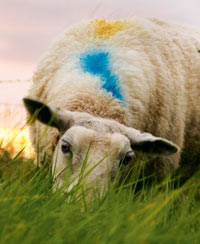Easy to care for sheep are key to success

Sheep producers should “cure problems from the maternal side” and select for easy care animals, said New Zealand farmer Andrew Puddy.
Speaking at South Sheep, Chilbolton Down Farm, Stockbridge, Mr Puddy said good record keeping and a low tolerance of poor performing ewes, was key to success in the 20,000 Romney ewes farmed among the Wairere flocks throughout New Zealand.
“We record key data at birth by covering the hills on horseback and note ewe reaction, selection of lambing site and how the ewe stays with her lamb.”
All ewes that required assistance at lambing or didn’t rear lambs go to a “B” flock where they are mated to a terminal breed.
“It’s all about weight of meat out the gate – whether it’s a store or prime product is irrelevant,” he said.
And Hampshire sheep farmer, and host shepherd for the event, Martyn Fletcher, has taken a similar approach with the flock of 1800 Lleyns at Chilbolton Down Farm.
“We made the decision to replace our Mule flock with Lleyns to reduce labour costs and improve efficiency from grass and turnips.
“The Lleyn is already a good breed, but it is all about getting the best from them in your system.”
And EID has been a valuable management tool for recording ewe performance. “We record a range of data, including ease of lambing and mothering ability which is fed into the computer program to generate a score for traits.”
Any animal with a negative value is then assessed for future breeding. “Any high negatives or stock in the bottom 10% for lamb liveweight gain are put to a terminal breed.” And only ewes that have twins are bred for replacements.
